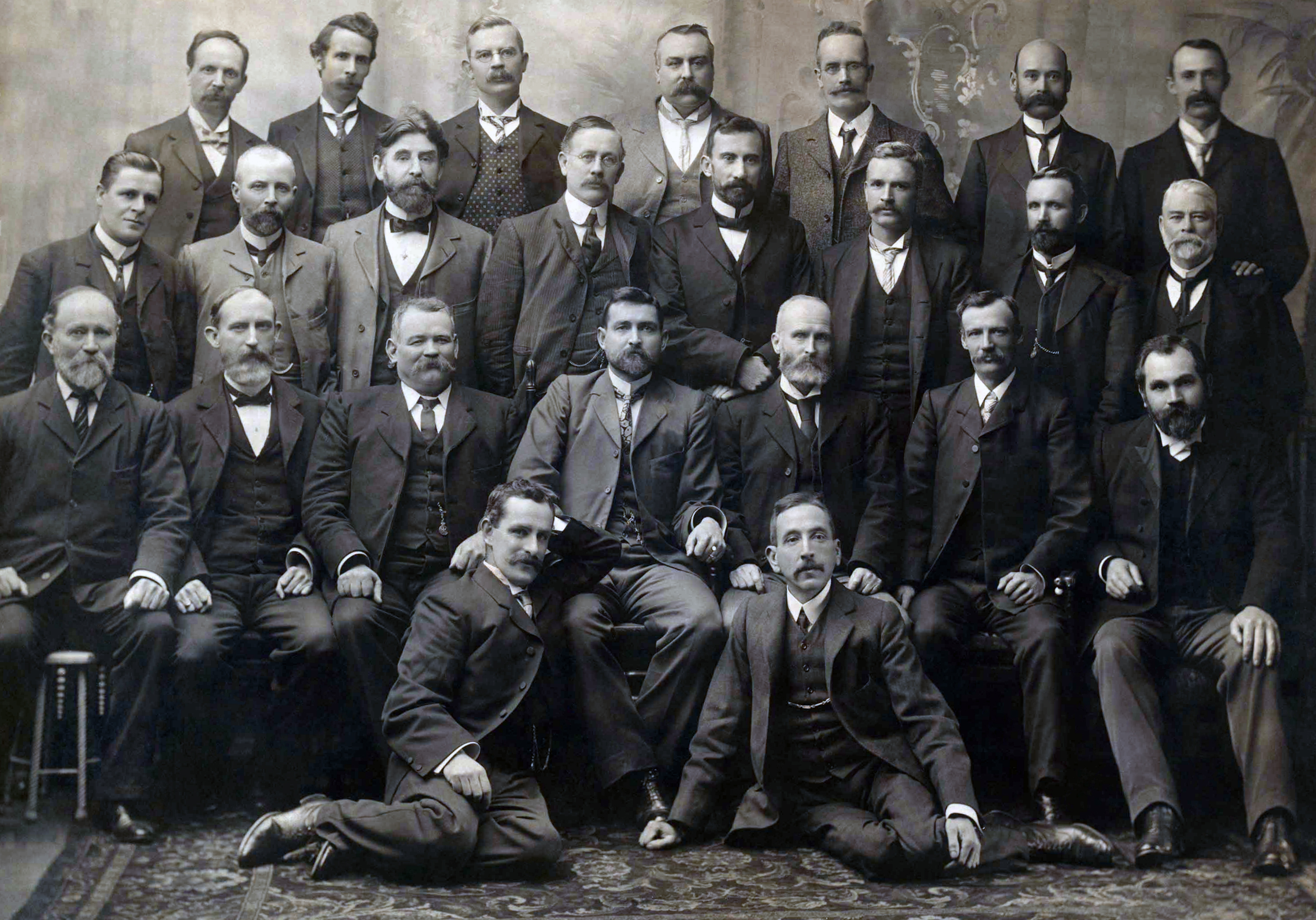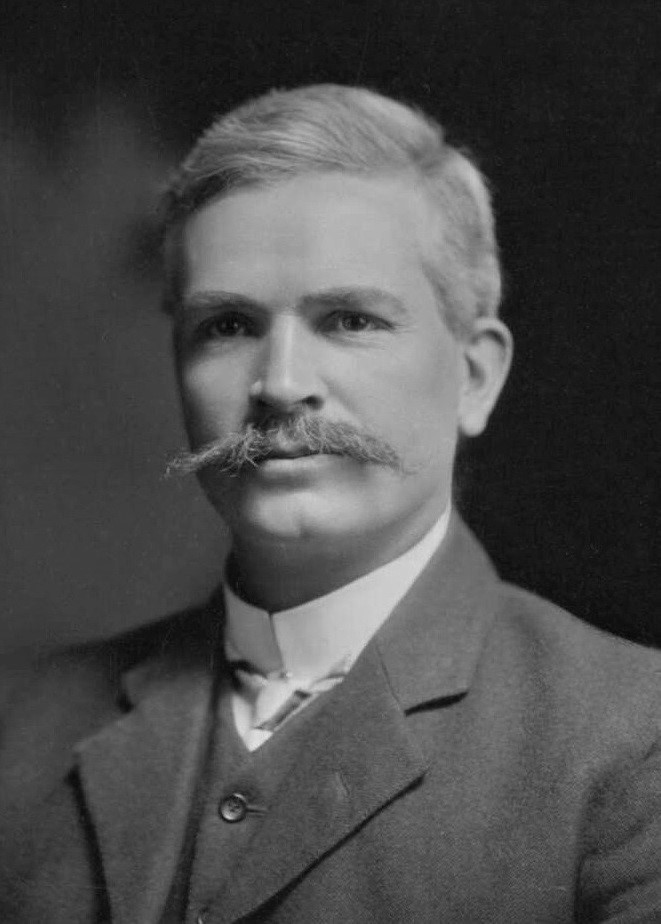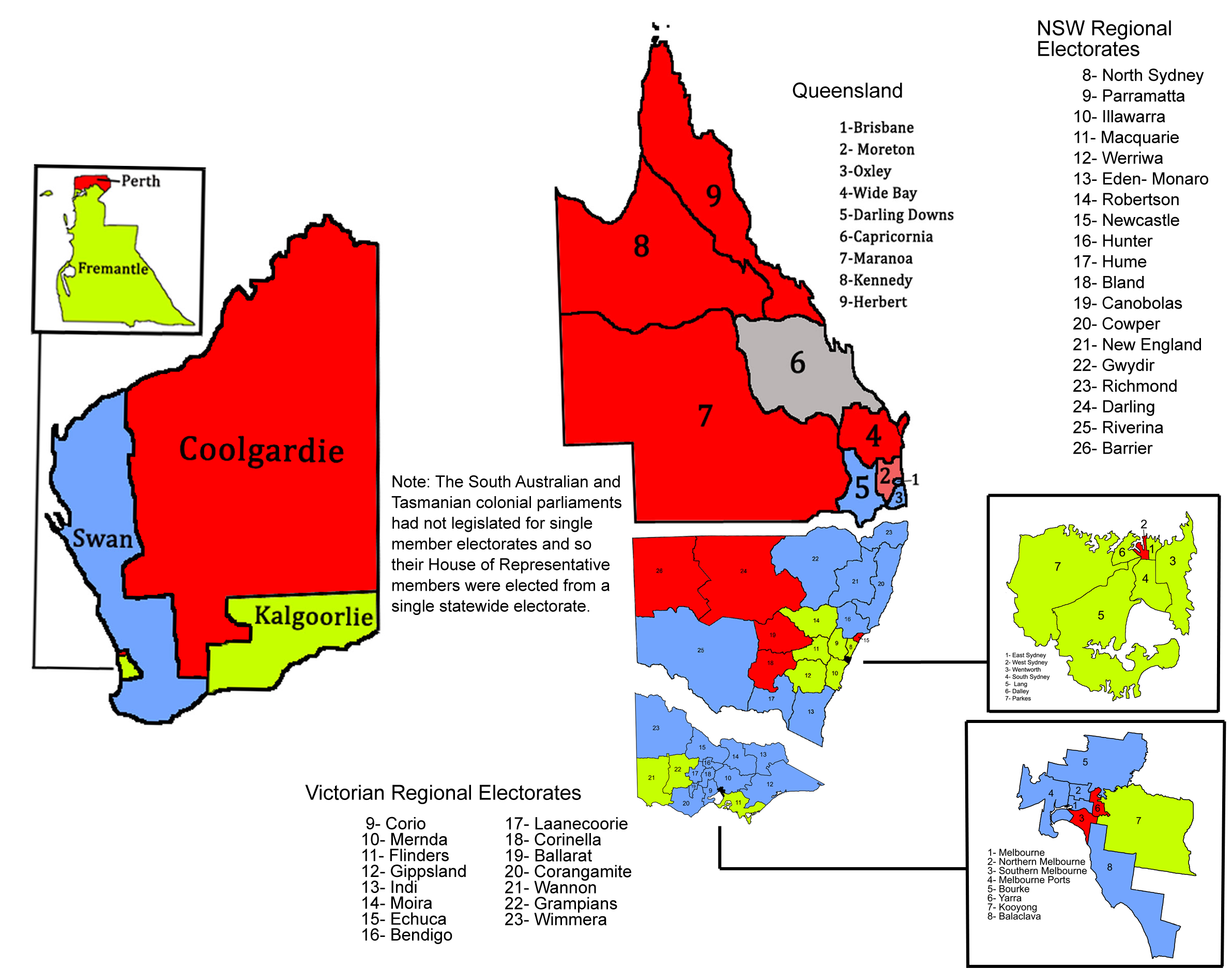|
Gregor McGregor
Gregor McGregor (18 October 1848 – 13 August 1914) was an Australian politician who served as a Senator for South Australia from 1901 until his death in 1914, representing the Labor Party. He was the party's inaugural Senate leader, and served three terms as Leader of the Government in the Senate. Early life McGregor was born on 18 October 1848 in Kilmun, Argyll, Scotland. He was the son of Jane and Malcolm McGregor. His father was a gardener, and in 1854 the family moved to County Tyrone, Ireland, where he became the chief gardener to Sir Gerald Aylmer (one of the Aylmer baronets). McGregor left school at a young age to join his father. He later spent two years working as an agricultural labourer in England, and then returned to Scotland to work in the Glasgow shipyards. In 1877, McGregor immigrated to South Australia. He initially worked as an agricultural labourer, and for a period he was employed by Richard Baker, one of his future Senate colleagues. In 1885, McGregor ... [...More Info...] [...Related Items...] OR: [Wikipedia] [Google] [Baidu] |
The Honourable
''The Honourable'' (British English) or ''The Honorable'' (American English; see spelling differences) (abbreviation: ''Hon.'', ''Hon'ble'', or variations) is an honorific style that is used as a prefix before the names or titles of certain people, usually with official governmental or diplomatic positions. Use by governments International diplomacy In international diplomatic relations, representatives of foreign states are often styled as ''The Honourable''. Deputy chiefs of mission, , consuls-general and consuls are always given the style. All heads of consular posts, whether they are honorary or career postholders, are accorded the style according to the State Department of the United States. However, the style ''Excellency'' instead of ''The Honourable'' is used for ambassadors and high commissioners. Africa The Congo In the Democratic Republic of the Congo, the prefix 'Honourable' or 'Hon.' is used for members of both chambers of the Parliament of the Democratic Repu ... [...More Info...] [...Related Items...] OR: [Wikipedia] [Google] [Baidu] |
Justice Of The Peace
A justice of the peace (JP) is a judicial officer of a lower or ''puisne'' court, elected or appointed by means of a commission ( letters patent) to keep the peace. In past centuries the term commissioner of the peace was often used with the same meaning. Depending on the jurisdiction, such justices dispense summary justice or merely deal with local administrative applications in common law jurisdictions. Justices of the peace are appointed or elected from the citizens of the jurisdiction in which they serve, and are (or were) usually not required to have any formal legal education in order to qualify for the office. Some jurisdictions have varying forms of training for JPs. History In 1195, Richard I ("the Lionheart") of England and his Minister Hubert Walter commissioned certain knights to preserve the peace in unruly areas. They were responsible to the King in ensuring that the law was upheld and preserving the " King's peace". Therefore, they were known as "keepers of th ... [...More Info...] [...Related Items...] OR: [Wikipedia] [Google] [Baidu] |
Andrew Fisher
Andrew Fisher (29 August 186222 October 1928) was an Australian politician who served three terms as prime minister of Australia – from 1908 to 1909, from 1910 to 1913, and from 1914 to 1915. He was the leader of the Australian Labor Party (ALP) from 1907 to 1915. Fisher was born in Crosshouse, Ayrshire, Scotland. He left school at a young age to work in the nearby coal mines, becoming secretary of the local branch of the Ayrshire Miners' Union at the age of 17. Fisher immigrated to Australia in 1885, where he continued his involvement with trade unionism. He settled in Gympie, Queensland, and in 1893 was elected to the Queensland Legislative Assembly as a representative of the Labor Party. Fisher lost his seat in 1896, but returned in 1899 and later that year briefly served as a minister in the government of Anderson Dawson. In 1901, Fisher was elected to the new federal parliament representing the Division of Wide Bay. He served as the Minister for Trade and Customs f ... [...More Info...] [...Related Items...] OR: [Wikipedia] [Google] [Baidu] |
Vice-President Of The Executive Council
The Vice-President of the Executive Council is the minister in the Government of Australia who acts as the presiding officer of meetings of the Federal Executive Council when the Governor-General is absent. The Vice-President of the Executive Council is appointed by the Governor-General on the advice of the Prime Minister of Australia, and serves at the Governor-General's pleasure. The Vice-President is usually a senior minister in Cabinet, who may summon executive councillors and preside at council meetings when the Governor-General is not present. However, the Vice-President cannot sign Executive Council documents on behalf of the Governor-General. The current Vice President of the Executive Council is Senator Katy Gallagher, who was appointed on 23 May 2022. Duties and history The duties of the Vice-President of the Executive Council are not rigorous, and the position is usually held by a Member of the Cabinet, who is not paid additional salary or allowance. The position ... [...More Info...] [...Related Items...] OR: [Wikipedia] [Google] [Baidu] |
Hugh Mahon
Hugh may refer to: *Hugh (given name) Noblemen and clergy French * Hugh the Great (died 956), Duke of the Franks * Hugh Magnus of France (1007–1025), co-King of France under his father, Robert II * Hugh, Duke of Alsace (died 895), modern-day France * Hugh of Austrasia (7th century), Mayor of the Palace of Austrasia * Hugh I, Count of Angoulême (1183–1249) * Hugh II, Count of Angoulême (1221–1250) * Hugh III, Count of Angoulême (13th century) * Hugh IV, Count of Angoulême (1259–1303) * Hugh, Bishop of Avranches (11th century), France * Hugh I, Count of Blois (died 1248) * Hugh II, Count of Blois (died 1307) * Hugh of Brienne (1240–1296), Count of the medieval French County of Brienne * Hugh, Duke of Burgundy (d. 952) * Hugh I, Duke of Burgundy (1057–1093) * Hugh II, Duke of Burgundy (1084–1143) * Hugh III, Duke of Burgundy (1142–1192) * Hugh IV, Duke of Burgundy (1213–1272) * Hugh V, Duke of Burgundy (1294–1315) * Hugh Capet (939–996), King of France * H ... [...More Info...] [...Related Items...] OR: [Wikipedia] [Google] [Baidu] |
Chris Watson
John Christian Watson (born Johan Cristian Tanck; 9 April 186718 November 1941) was an Australian politician who served as the third prime minister of Australia, in office from 27 April to 18 August 1904. He served as the inaugural federal leader of the Australian Labor Party (ALP) from 1901 to 1907 and was the first member of the party to serve as prime minister. Watson was born in Valparaíso, the son of a German Chilean seaman. He grew up on the South Island of New Zealand, taking the surname of his step-father when his Irish-born mother remarried. He left school at a young age, working in the printing industry as a Compositor (typesetting), compositor. Watson moved to Sydney in 1886 and became prominent in the local Australian labour movement, labour movement. He helped establish the Australian Labor Party (New South Wales Branch), Labor Electoral League of New South Wales and directed the party's campaign at the 1891 New South Wales colonial election, 1891 general election. ... [...More Info...] [...Related Items...] OR: [Wikipedia] [Google] [Baidu] |
Balance Of Power (parliament)
In parliamentary politics, balance of power is a situation in which one or more members of a parliamentary or similar chamber can by their uncommitted vote enable a party to attain and remain in minority government. The term may also be applied to the members who hold that position. The members holding the balance of power may guarantee their support for a government by either joining it in a coalition government or by an assurance that they will vote against any motion of no confidence in the government or will abstain in such a vote. In return for such a commitment, such members may demand legislative or policy commitments from the party they are to support. A person or party may also hold a balance of power in a chamber without any commitment to government, in which case both the government and opposition groupings may on occasion need to negotiate for that person's or party's support. Australia House of Representatives In the 1940 federal election of the 74 seats in the Hou ... [...More Info...] [...Related Items...] OR: [Wikipedia] [Google] [Baidu] |
1910 Australian Federal Election
The 1910 Australian federal election was held in Australia on 13 April 1910. All 75 seats in the House of Representatives, and 18 of the 36 seats in the Senate were up for election. The incumbent Commonwealth Liberal Party (the result of a merger between the Protectionist Party and the Anti-Socialist Party) led by Prime Minister Alfred Deakin was defeated by the opposition Labour Party, led by Andrew Fisher. The election represented a number of landmarks: it was Australia's first elected federal majority government; Australia's first elected Senate majority; the world's first Labour party majority government at a national level; after the 1904 Chris Watson minority and Fisher's former minority government the world's third Labour party government at a national level; the first time it controlled ''both'' houses of a bicameral legislature; and the first time that a prime minister, in this case Deakin, was defeated at an election. It also remains the only election in Australia's ... [...More Info...] [...Related Items...] OR: [Wikipedia] [Google] [Baidu] |
1903 Australian Federal Election
The 1903 Australian federal election was held in Australia on 16 December 1903. All 75 seats in the House of Representatives, and 19 of the 36 seats in the Senate were up for election. The incumbent Protectionist Party minority government led by Prime Minister Alfred Deakin retained the most House of Representatives seats of the three parties and retained government with the parliamentary support of the Labour Party led by Chris Watson. The Free Trade Party led by George Reid remained in opposition. The election outcome saw a finely balanced House of Representatives, with the three parties each holding around a third of seats − the Protectionists on 26 (−5), the Free Traders on 24 (−4) and Labour on 22 (+7). This term of parliament saw no changes in any party leadership but did see very significant and prolonged debates on contentious issues − the Protectionist minority government fell in April 1904 to Labour, while the Labour minority government fell in August 1904 to ... [...More Info...] [...Related Items...] OR: [Wikipedia] [Google] [Baidu] |
Andrew Kirkpatrick (Australian Politician)
The Hon Andrew Alexander Kirkpatrick (4 January 1848 – 19 August 1928) was an Australian politician, representing the South Australian Branch of the Australian Labor Party. He was a member of the South Australian Legislative Council from 1891 to 1897 and 1900 to 1909, a member of the South Australian House of Assembly from 1915 to 1918, and again a member of the Legislative Council from 1918 to 1928. He was the state Agent General in London from 1909 to 1914. Kirkpatrick was state Labor leader from 1917 to 1918, when the party split nationally over Billy Hughes' stance on conscription. Early life Kirkpatrick was born in 1848 and started working at the age of nine. He arrived in South Australia in 1860, went to night school, and apprenticed in the printing trade. He worked at '' The Advertiser'' and the Government Printing Office before founding his own printing firm. He served as the first president of the National Liberal Reform League in 1883, assisted in forming the U ... [...More Info...] [...Related Items...] OR: [Wikipedia] [Google] [Baidu] |
1901 Australian Federal Election
The 1901 Australian federal election for the inaugural Parliament of Australia was held in Australia on Friday 29 March and Saturday 30 March 1901. The elections followed Federation and the establishment of the Commonwealth of Australia on 1 January 1901. All 75 seats in the Australian House of Representatives, six of which were uncontested, as well as all 36 seats in the Australian Senate, were up for election. After the initial confusion of the Hopetoun Blunder, the first Prime Minister of Australia, Edmund Barton, went into the inaugural 1901 federal election as the appointed head of a Protectionist Party caretaker government. While the Protectionists came first on votes and seats, they fell short of a majority. The incumbent government remained in office with the parliamentary support of the Labour Party, who held the balance of power, while the Free Trade Party formed the opposition. A few months prior to the 1903 election, Barton resigned to become a founding membe ... [...More Info...] [...Related Items...] OR: [Wikipedia] [Google] [Baidu] |







